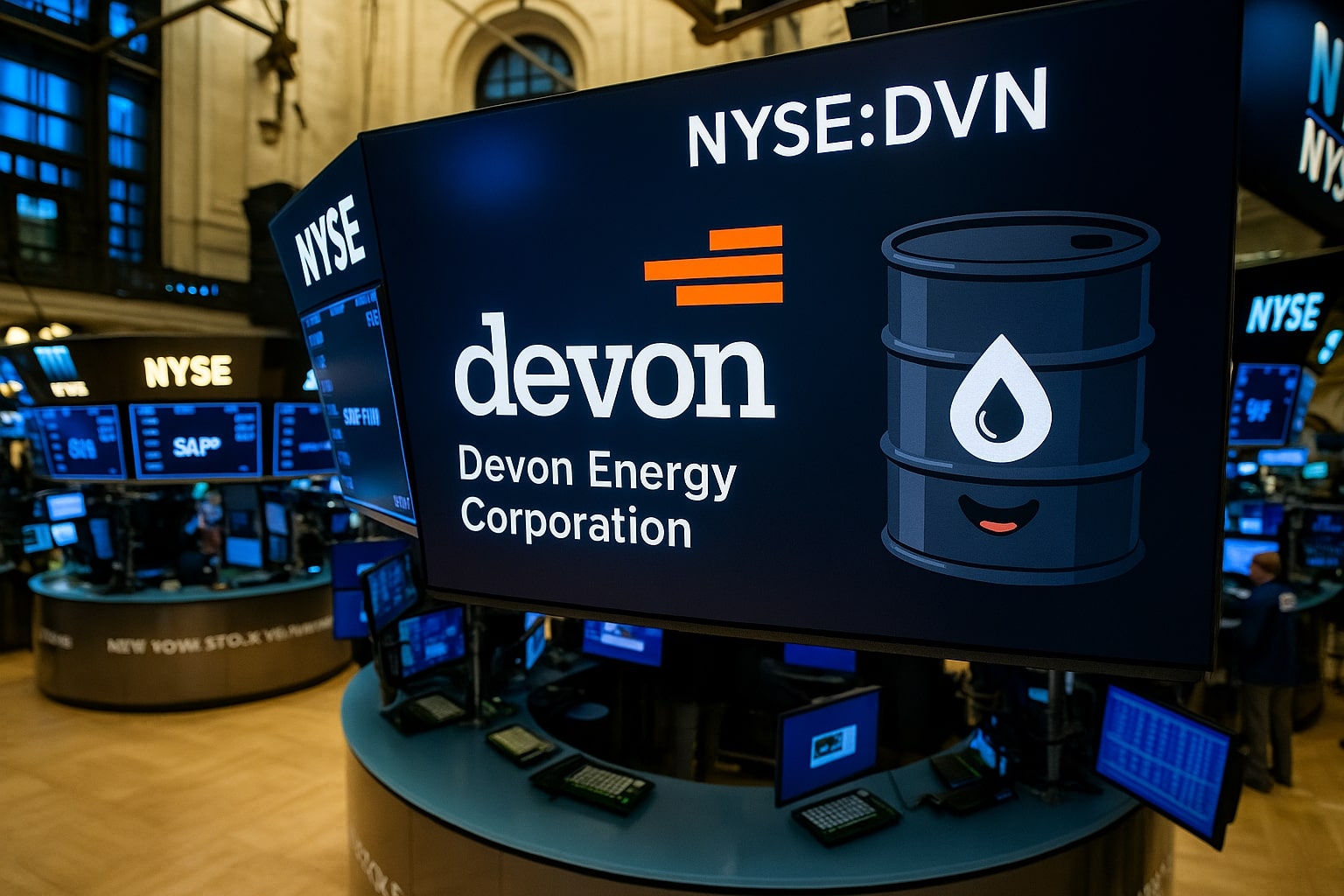
Devon Energy (NYSE:DVN) Stock Forecast: DVN Trades at $46.20 With Strong Cash Flow Outlook
Oil at $77, Capital Discipline, and $300M Tax Savings Drive Devon’s Stock Forecast | That's TradingNEWS
Devon Energy (NYSE:DVN) Stock Forecast: Cash Flow Strength, Capital Efficiency and the Weight of Oil Prices
NYSE:DVN Beats Guidance With Volumes and Capital Discipline
Devon Energy NYSE:DVN exceeded expectations in its latest quarter. Production volumes were 3% above midpoint guidance, while capital spending came in 7% below target, saving more than $70 million. The company brought 110 wells online, generating nearly $600 million in free cash flow (FCF) despite softer crude benchmarks. Management reinforced its edge in capital efficiency by reducing 2024 spending guidance by $400 million while raising production by 7,000 barrels per day, an improvement that cements Devon’s ability to deliver returns in volatile oil markets.
Shareholder Returns and Balance Sheet Priorities
Devon earned $0.84 per share in the quarter, backed by $1.5 billion in operating cash flow. From this, nearly $600 million in FCF was returned through $156 million in dividends and $249 million in share repurchases. The share count continues to decline, boosting per-share value. Devon’s balance sheet shows a net debt-to-EBITDAX ratio of 0.9x, with $1.8 billion in cash against $6.5 billion net debt. Management is executing a $2.5 billion debt reduction plan, further lowering interest expense. Dividend breakeven remains below $45 WTI, providing room for steady payouts. For insider positioning, see DVN insider transactions.
Guidance and Production With Grayson Mill Acquisition
The $5 billion Grayson Mill acquisition is already delivering. Within four months, Devon achieved 40% of synergy targets, with another $500 million expected by 2026. The deal included $1.75 billion in equity issuance, but the asset carries a 15% FCF yield at $80 WTI, ensuring accretion. Updated guidance shows 387,000 barrels per day production on $3.7 billion in CAPEX, equating to a capital intensity of $26 per barrel. This supports $2.9 billion in annual FCF, or a 15% yield relative to current equity values.
Cash Flow Resilience in a Soft Oil Tape
Even as WTI crude fell nearly $10 per barrel since January, Devon maintained strong FCF margins. Quarterly results annualize to $2.4 billion FCF, an 11.2% yield, just below early-year estimates of 12%. This resilience stems from disciplined spending, improved NGL realizations, cheaper midstream fees, and IT efficiencies. Forward guidance points to another $200 million in NGL and midstream savings, plus $45 million from IT and debt reductions, improving 2026 FCF margins by another 10%.
Tax Savings Add Structural Upside
New legislation passed in late 2024 — nicknamed the “One Big Beautiful Bill” — will slash Devon’s effective tax rate by half. Starting in 2025, management expects $300 million in annual tax savings, compounding into 2026–2027. With Devon paying over $800 million in taxes in the last twelve months, this savings is equal to another 10% improvement in FCF. Analysts have yet to fully price this hidden lever into DVN’s multiple.
Valuation Versus Permian Peers
At approximately 4x EBITDA, Devon trades at a discount of nearly two turns to larger Permian peers. This gap persists despite DVN’s 11–15% FCF yield and higher capital efficiency. With tax and cost synergies not reflected in valuation, DVN is materially undervalued relative to its production profile and cash return strategy.
Risks: Crude Price Sensitivity and OPEC+ Supply
The main overhang is oil pricing. OPEC+ added 2.2 million barrels per day of new supply, tilting markets into oversupply. While Devon remains profitable above $65 WTI, sustained weakness below $60 would compress FCF yields under 10%, capping returns. Peer producers also show reluctance to cut output, raising risk of prolonged oversupply across the next 12–18 months.
Trading Outlook and Final Verdict on NYSE:DVN
Devon Energy NYSE:DVN combines above-guidance volumes, cost discipline, a $2.9 billion FCF outlook, and a 7% shareholder yield. With valuation discounts versus peers and tax relief adding hidden upside, the stock offers compelling value even as oversupply pressures weigh on oil benchmarks. At current trading levels, Devon remains a BUY, backed by double-digit free cash flow yields, capital discipline, and shareholder-friendly capital allocation.
That's TradingNEWS
Read More
-
IVV ETF Price Forecast: Is $684 Still Worth Paying For S&P 500 Exposure?
14.02.2026 · TradingNEWS ArchiveStocks
-
XRP ETF Rally: XRPI at $8.09 and XRPR at $11.60 as XRP-USD Rebounds Toward $1.47
14.02.2026 · TradingNEWS ArchiveCrypto
-
Natural Gas Futures Price Holds Around $3.20 as Storage Tightens and Winter Premium Fades
14.02.2026 · TradingNEWS ArchiveCommodities
-
USD/JPY Price Forecast: Yen Strength Turns 152 into a Make-or-Break Level
14.02.2026 · TradingNEWS ArchiveForex


















